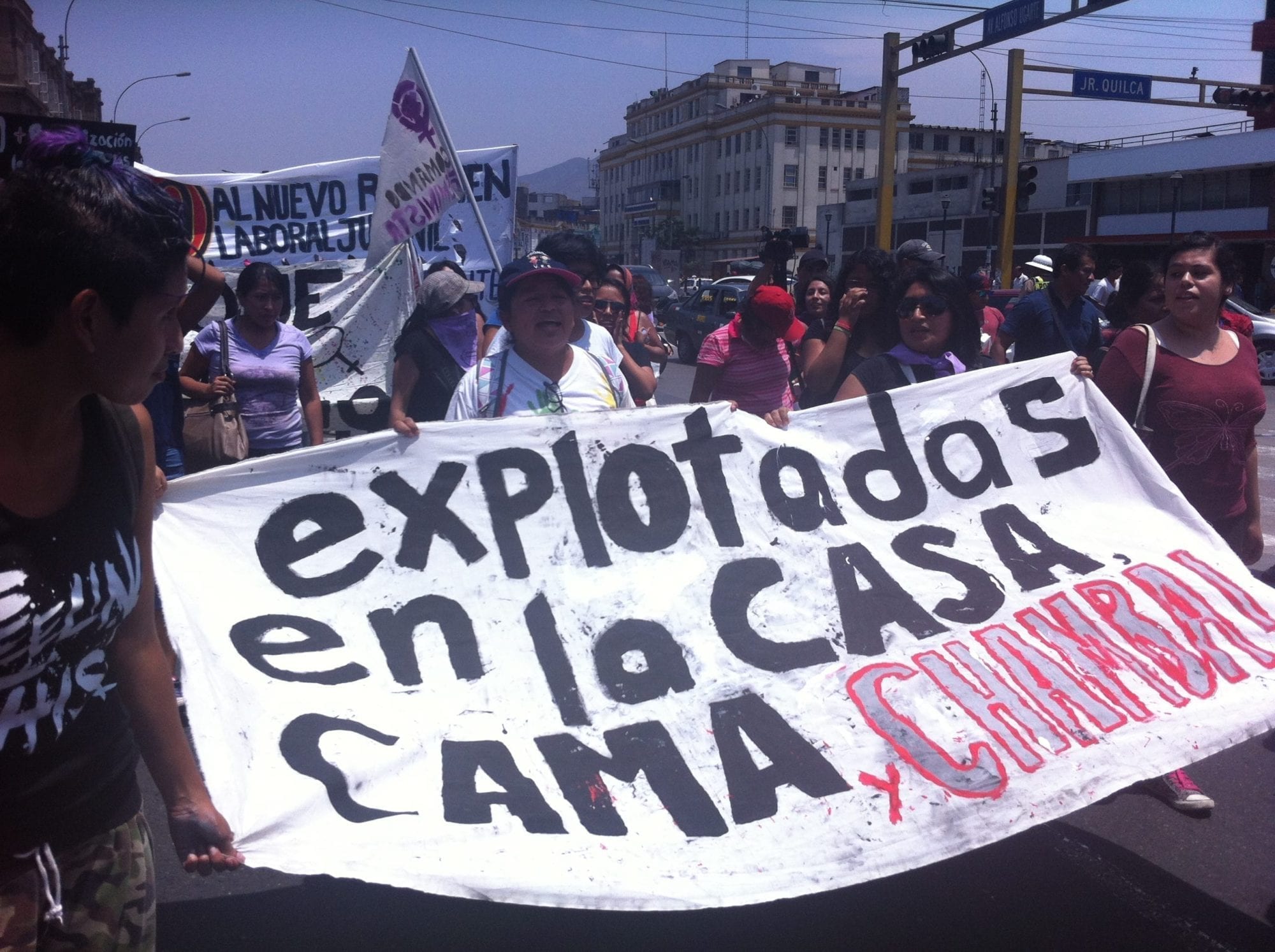
Jan 28, 2015
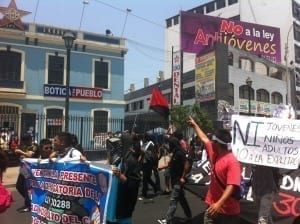
Credit: Solidarity Center/Luis Mendoza
Workers in Peru are celebrating the repeal this week of a labor law that targeted young workers, a huge victory that followed weeks of street demonstrations and protests by working people and their unions.
Peru’s Congress voted 114–91 to repeal the law, which reduced salaries and benefits for workers under age 25. A recent poll showed only one-fifth of Peruvians supported the law.
“They never asked young people what they thought,” says one worker, who took part in the protests.

The secretary general of the Topitop textile union featured on the cover of Peru’s La Republica as workers celebrated repeal of the labor law.
Ultimately, workers say, the law would not only have harmed young workers.
Jorge, an apparel worker at a Topitop factory that employs 2,400 workers, puts it this way: “What the company wants is to fire us and replace us with younger workers without any benefits.” Adds Abel, also a garment worker: “What we are doing is defending ourselves, our children and our future grandchildren.”
Young labor activists from the textile and apparel, export-oriented agriculture and mining sectors took vocal positions against the law and helped lead protests. The Solidarity Center, with support from the U.S. Department of Labor, works closely with young Peruvian worker activists to help them analyze their labor rights; develop leadership, negotiating and organizing skills; and learn to advocate for their issues.
As students, young workers and the Peruvian labor movement look toward upcoming campaigns to push for approval of a general labor law, an increase in the minimum wage and the repeal of another recent law that makes it easier for employers to conduct mass layoffs, the Solidarity Center plans to continue to work alongside union allies at the workplace, federation and confederation level to identify lessons learned from this experience and ensure that young workers can continue to provide leadership in union building and policy campaigns.
Apr 4, 2014
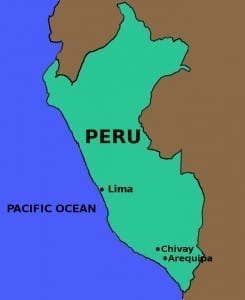 Thousands of Peruvians marched in Lima, the capital, yesterday in a strong show of support for an end to organized crime and related violence in Peru’s booming construction sector.
Thousands of Peruvians marched in Lima, the capital, yesterday in a strong show of support for an end to organized crime and related violence in Peru’s booming construction sector.
Unions and civil society leaders called for a systemic solution to the phenomenon of false “unions” that extort construction firms and turn building sites into battlefields across Peru. Violence related to worksite conflicts has resulted in the death of six construction worker union activists over the last three years and significant economic losses that affect construction projects, workers and their families.
Leaders of the march include the General Confederation of Workers of Peru (CGTP), the Construction Workers Federation, the Peruvian Human Rights Commission, the mayor of Lima, regional lawmakers and the Peruvian Chamber of Construction.
Mar 14, 2014
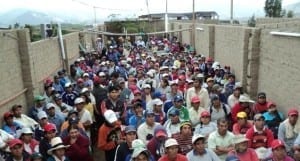
Camposol employees at a company assembly. Credit: Solidarity Center
Eighteen agricultural workers in Peru were detained during a work stoppage as they protested an agro-industrial company’s failure to uphold its collective bargaining agreement, according to the Camposol Workers’ Union (SITECASA). One union leader, Carmen Silvestre Rodríguez, was beaten by the national police, and the union’s general secretary, Felipé Arteaga, has been arrested, the union said.
SITECASA members began a peaceful work stoppage March 12 at the company’s facilities in Chao, a town in the country’s northern region. They are seeking the company’s compliance with several provisions in the region–wide collective bargaining agreement reached in July 2013, including resolution of daily production quotas for field workers, payment of annual profit sharing and provision of proper uniforms, footwear and meals for workers.
Field workers, who harvest avocados, mandarin oranges, mangoes and blueberries for export, currently must harvest 60 pallets before they receive their minimum daily wage of $11. According to the union, Camposol has conditioned its willingness to negotiate these points on the union’s retraction of an article in the collective bargaining agreement that provides employment stability (an indefinite contract) for workers with four years working for the company.
Camposol S.A. is Peru’s largest producer and exporter of non-traditional horticultural products like asparagus. Approximately 14,000 workers labor on Camposol’s vast plantations throughout the country. In 2012, the U.S. Department of State’s Human Rights Report cited Camposol for interfering with workers’ right to strike after the company failed to reinstate 250 workers dismissed for participating in a strike during collective bargaining.
Read the union’s full statement (Spanish).
Mar 10, 2014
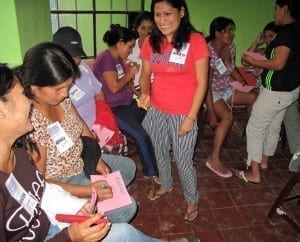
Violeta co-facilitated a workshop after learning skills from a Solidarity Center-sponsiored training. Credit: Samantha Tate
Rosa Pérez was brought to Lima, Peru, from the country’s Northern Sierra when she was a child to work as a domestic worker. As a young adult, she moved to the farming region of La Libertad to make her own way as an agricultural laborer. Thirty years, four children and five grandkids later, Perez has become a bold advocate for her co-workers. She encourages them to document and speak out about problems such as sexual harassment and inadequate safety and protection equipment and training.
Pérez, secretary of Women’s, Child and Adolescent Affairs of the Camposal Workers’ Union (Sindicato de Trabajadores de la Empresa Camposal), is a leader in a Solidarity Center program to empower women farm workers in Peru. Since 2009, the program, which includes the National Federation of Farm Workers (Federación Nacional de Trabajadores de la Agroindustria y Afines, FENTAGRO), has involved training and advocacy activities with unions representing workers in export-oriented agriculture.
The initiative gained momentum after Pérez traveled to São Paulo, Brazil, last year to participate in the Solidarity Center conference, “Women’s Empowerment, Gender Equality and Labor Rights: Transforming the Terrain.” There, she addressed more than 100 women from around the world and described working conditions for women farm workers in Peru and the actions that her union and FENTAGRO are taking to build a better life for women like her daughter, who works alongside her.
Pérez took the strategies she learned from activists at the conference to the farm worker federation’s leadership Friday, the eve of International Women’s Day. Along with the Solidarity Center, Pérez is recommending that La Libertad’s three unions meet with regional government officials and possibly employers to advocate for literacy programs targeting working women. She also plans to propose an awareness-raising campaign for men and women about sharing domestic and family care. The Solidarity Center has also been working with unions to strengthen their arguments for collective bargaining with employers in support of maternity and breastfeeding benefits that are codified in Peruvian law but not generally enforced.
Following the Women’s Empowerment conference, Perez worked with the Solidarity Center to identify 12 dynamic women from three export-oriented agriculture farms to take part in a Solidarity Center training this year geared toward building women’s confidence and strengthening their leadership skills so they can effectively advocate for women workers’ issues within their unions, their workplaces and their communities.
One of the workers who joined the training, Apolonia, is an elected officer in the Union of Agrícola Viru Workers (Sindicato de Trabajadores de la Empresa Sociedad Agrícola Virú, SITESAV). She grows and harvest fruits and vegetables as part of Peru’s export-agriculture industry, which, in 2013, generated $33 million in exports to the United States. She advises her fellow co-workers, especially young women, about how to stay healthy and build strong families while working between 12 hours and 14 hours a day and earning an average daily wage of $12.
Apolonia and other participants in the two-day training discussed how they can improve workplace safety and other issues and shared their dreams about bettering their workplaces, unions and households.
Two weeks after the leadership training, nearly all of the women who participated in the workshop, including Violeta and María Luna, who had been reluctant to speak in public, co-facilitated small workshops with groups of their peers using the new techniques they learned from the Solidarity Center training, including public speaking and one-on-one-contact to encourage self-confidence and participation.
The La Libertad network of women farm workers now has a compact disk with the stories of 32 Peruvian women leaders they can share in small study circles or at worker assemblies and when training other groups of women. It is the beginning of a much longer process that already has helped a group of powerful women to find their voice and begin to use it.
Feb 14, 2014
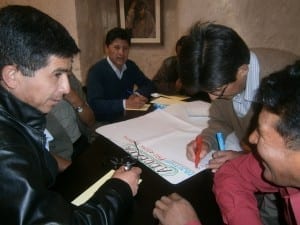
Textile workers at a meeting in Arequipa, where union leader López was fired after a successful contract campaign. Credit: Milko Sotomayor
José López Mota, former leader of a textile workers’ union local in Peru and current general secretary of the regional textile federation FERRETEX, was fired on February 10, 2014. He was dismissed after the union achieved a collective bargaining agreement in late 2013 for allegedly missing more than 15 days of work without permission. However, López was conducting union business during those days, using legally mandated union leave.
López led a highly visible campaign at the garment and yarn manufacturing factory where he worked, calling for management to negotiate a fair collective bargaining agreement. The union’s peaceful work stoppages that followed more than six months of labor-management negotiations were ultimately successful in gaining workers a collective bargaining agreement.
“They want a leader who does not speak up. I fought for union rights and alongside my brothers and sisters, we achieved two significant improvements in the two years that I was in charge,” López told Peruvian newspaper La República.
Last month, the union held elections in which López was replaced as general secretary. Although he continues to serve as the general secretary of the regional textile federation, he no longer is protected by “union immunity” (fuero sindical) extended to workplace union leaders.
The factory management says López took days off without permission. During that time, López used his protected right to take union leave to help conduct contract negotiations and attend labor conciliation meetings with company participation at the Arequipa regional labor directorate. But because he did not always ask for days off in writing, he has no paper trail to prove he was absent for legitimate union work.
“These methods (of repression) that were common practice in the past no longer generate the effect desired by employers who continue in this retrograde mentality,” said Geronimo López, Arequipa Region secretary-general of the Confederación General de Trabajadores del Perú (CGTP). The CGTP is one of Peru’s four main union federations. “On the contrary, to confront these anti-union actions, workers understand that they need to strengthen their unity and act with even greater commitment to defend their rights.”
Peruvian labor federations and international organizations are concerned about this violation of International Labor Organization (ILO) Conventions 87 and 98 (freedom of association and freedom to form a union and collectively bargain), and the intimidation tactics used to silence a labor rights defender in Arequipa’s booming textile and apparel sector.







